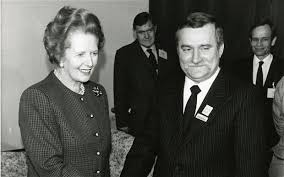Gdansk
Posted by celticman on Sun, 27 Oct 2019

In November, 1988, a crowd of around 20 000 cheered as the Iron Lady, Margaret Thatcher, met Lech Walesa. He was a shipyard worker from the Lenin shipyard in Gdansk and leader of Solidarity, the independent Polish trade union movement.
Gen. Wojciech Jaruzelski had Thatcher’s car stopped before she reached the airport to board a Royal Airforce jet to London and presented her with a bouquet of flowers.
‘I came to see and to have a long talk with Mr. Walesa . . . . I knew that I had to come and feel the spirit of Poland for myself,’ said Thatcher.
Almost thirty years ago, 17th September 1980, Walesa led a strike against a programme of economic austerity in which the Gdansk shipyard would close.
Walensa’s key demands were reinstatement of sacked workers and a wage rise for those in work. Strikes spread to other industries and throughout Poland.
‘We shall not be found wanting when Poland makes the progress toward freedom and democracy its people clearly seek,’ Thatcher said, garnering praise for her support of a free trade union movement.
Arthur Scargill, leader of the National Union of Mine Workers, in the miner’s strike, 1984-85, key demands were no different from Walesa, with his claim that the National Coal Board in the name of economic austerity had a ‘hit list’ of 75 pit closures and the government was stockpiling coal and converting power stations to burn other fossil fuels.
The spirit of Poland, support for a free trade union movement, and freedom of movement were reported sorely missing from the spirit of Thatcherism. 84 000 miners and then there were none. Lest we forget, that’s democracy for you.
- celticman's blog
- Log in to post comments
- 989 reads



Comments
Interesting memory, and
Interesting memory, and comparison. Makes you think!
yeh, it does David. Election
yeh, it does David. Election coming up, I wish people would think.